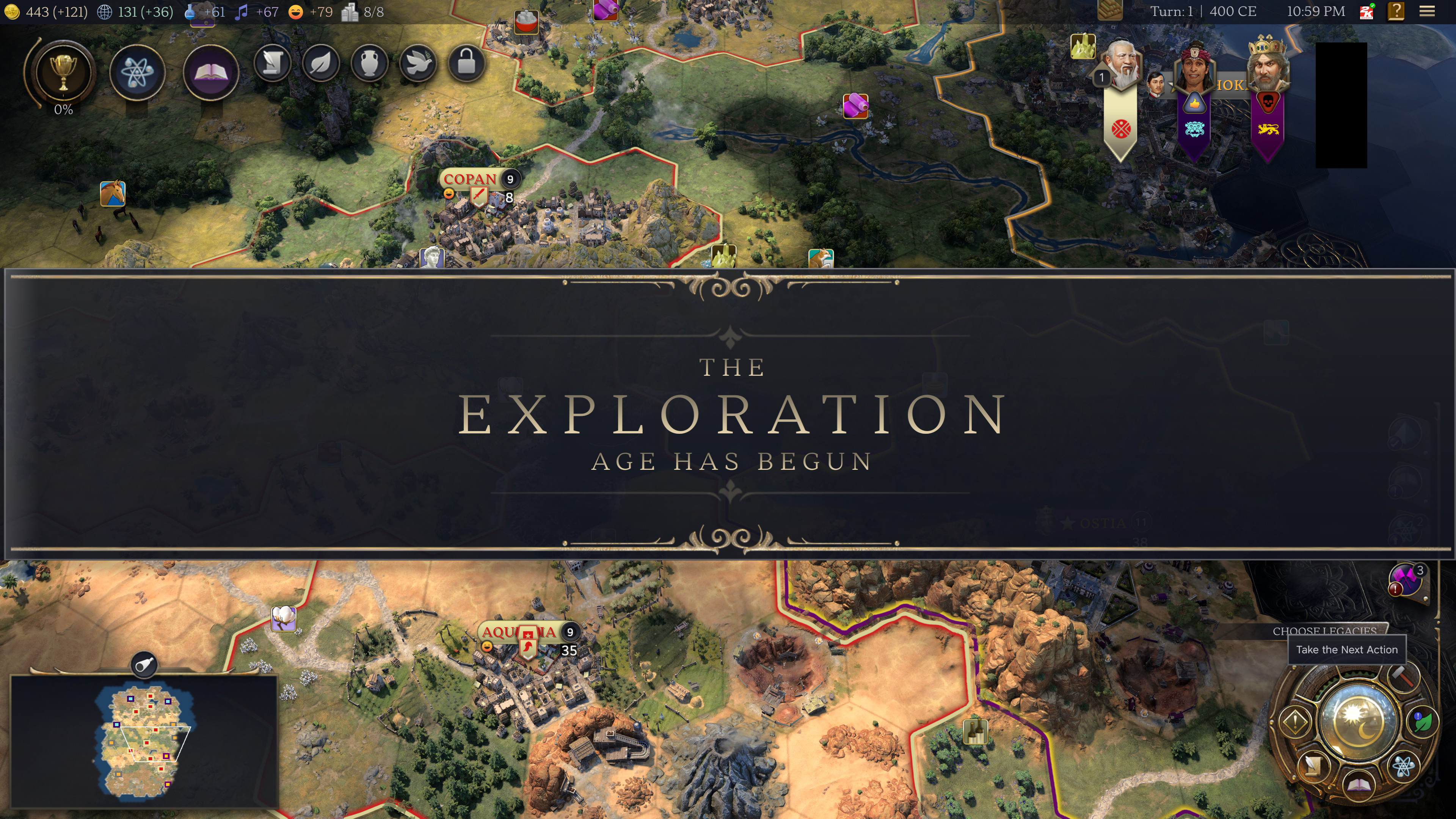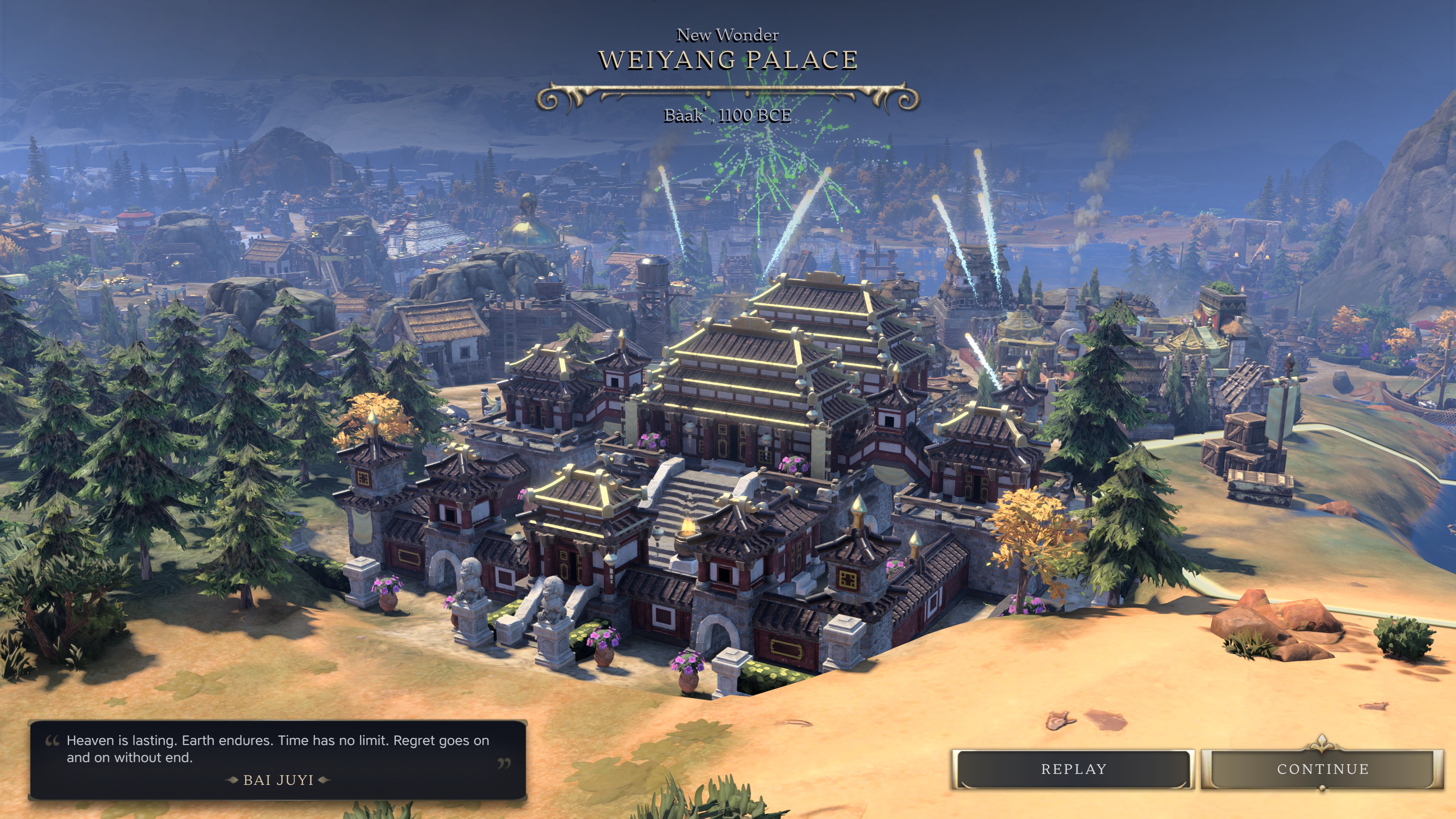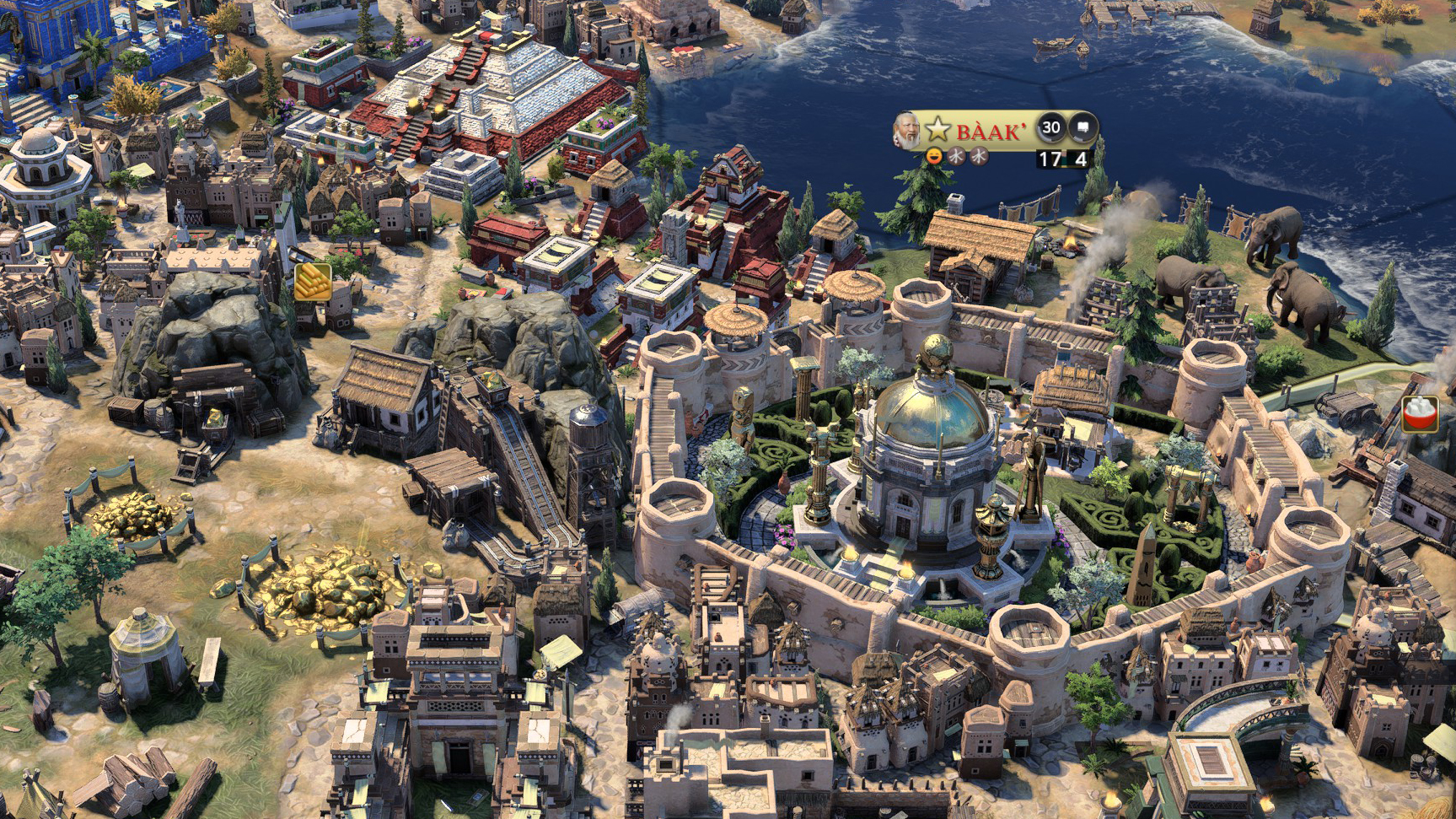It’s judgement day for Charlemagne of the Roman Empire (not ‘Holy’ Roman Empire, I hasten to add, as leaders are no longer attached to their historical civilisations in Civilization 7). I’m playing the grand strategy game for PC Gamer’s forthcoming review—it’s out February 11—and after several millennia of strained diplomacy with Charlemagne, throughout which I’d graciously accept his Open Borders proposals while he’d dismiss my own and slowly grow to dislike me due to our agendas not aligning, I march on his empire, his capital still hidden somewhere beneath the cold stone hexes that make up the fog of war.
There’s a dramatic end-of-days quality to the conflict that ensues. This is the end of the Age of Antiquity. The march of progress through this era, which is amassed collectively by the cultural, economic, military, and scientific achievements of all civilisations in the game, is almost at an end; the building of glorious wonders and other milestones of progress has been replaced by a continental plague—one of several ‘Crisis’ scenarios that automatically ensue towards the end of an era—and a war that’s somehow pulled in every civilisation and city-state on the land (clearly, I wasn’t the only one who had enough of Charlemagne’s Byzantine bullshit).
The apocalyptic feel is enhanced by the fact that I have no real idea of how the world will look after the transition from Antiquity to the Age of Exploration. The game’s been warning me to brace myself, but even that couldn’t prepare me for what may well be the most radical, disruptive mechanic in the history of the series.
My Mayan armies tear through the Roman Empire, led by Commanders that offer new tactical twists to the game’s combat. Building on the Great General units of previous games, Commanders grant buffs to surrounding units, but also act as carriers, letting you bundle several units onto them and traverse the map on a single tile. Then, when you’re ready for battle, you de-stack your armies around the commander, who can bark unique orders such as ‘Focus Fire’ to strengthen your attacks. Individual units no longer gain XP in battle. Instead, all combat XP goes to the nearby commander, and is spent in skill trees that let you bolster their effectiveness not only in combat but in peacetime (such as by having them improve yields when they’re stationed in a city).
Before long, Charlemagne’s capital is in my sights. With the Age of Antiquity 98% complete, I’m determined for the sacking of Rome to bookmark this era (even if I’m a little disappointed at the meagre resistance, making me wonder whether Firaxis have resolved the previous game’s notorious AI issues). My horsemen pillage through the city’s outskirts and wipe out the weirdly unprotected Roman commanders, my ballistas rain hell on the city centre, and finally my humble Jaguar Slayers stroll into the virtually defenceless capital.
With that, the Age of Antiquity comes to an end.
A brave new age

This is where, for anyone familiar with the usual flow of a Civ game at least, things get a little crazy. With one turn left to prep myself for the next age, I attach my finest units to commanders, understanding that they would carry over to the new age this way (as it transpired, all my military units got deleted anyway, which is odd as the Civopedia really suggested otherwise, so I’ve contacted Firaxis to figure out what happened here).
When the age transition finally comes, it’s like one game ends then another begins. The triumphant theme music kicks in, and you get to pore over the legacy points you’ve accrued as well as the end-of-age rankings. Next, you pick a new civilisation to lead into the next era. As much of my Mayan civ was based around rivers, I met the criteria to unlock the Songhai for the Exploration era, who offer bonuses for river tiles as well as various tradey-economical boons.
I definitely felt a pang of longing for my Mayan civ with which I’d achieved so much, but its triumphs and accomplishments live on into the new era. Your territory remains intact, your commanders survive and retain their promotions, and the spirit of your previous civ lives on through unique districts, Wonders, and traditions that you can use as social policies. Then there are Legacy Points, which you earn by hitting various milestones along the four legacy paths: Economic, Cultural, Science, and Military. In my case, I went all in on science in antiquity, which unlocked high-end scientific legacy options such as Golden Age Libraries and the option to convert all my accrued Antiquity-era Great Works—which disappear with the era transition—into Science currency.

But a lot also changes in the thousand or so years that the game skips in the age transition. Those city-states you buddied up with are gone, replaced by new ones placed elsewhere on the map. Your antiquity-era units, apart from your commander, are wiped out and replaced by a baseline army of six new-Age units spread throughout your empire, and your social policies, antiquity-era building adjacency bonuses, and codices are all gone. Perhaps the most drastic change is that all your cities outside of your capital revert to towns, which basically reduces them to resource-feeders—albeit very efficient ones, from experience—for your empire until you convert them to cities using gold.
Times are a’changin’
The centuries that passed in that age transition were closely reflected in the time I spent poring over my legacy and civ choices for the new age. Once I confirmed everything, I emerged onto a whole new world, with adobe buildings and minarets replacing the wooden huts of the previous age, while my trusty loin-clothed Jaguar Slayers were replaced by armour-clad coursers and Gold Bangles Infantry (a Songhai unique unit). The soundtrack, as brilliant and catchy as ever, also shifted tenor from chanty Mayan and Buddhist beats to more of a medieval Middle Eastern flavour.
I’m still acclimatising to the impact of the Ages system, because the impact on the game is huge, though my early feelings on it are positive.
With many of the previous era’s perks gone, the gap between the top and bottom-ranked civ shrinks a fair bit (though not so much as to render your achievements up to that point meaningless), and the new opportunities and systems presented by the new era open up new paths for straggling civs to stage a comeback. Lands left behind by extinct city-states reignite that exciting early-game landgrabbing feel, while new seafaring techs let everyone set sail for new lands somewhat synchronously, rather than centuries apart. Organised religion comes into play too, replacing the rudimentary pantheons of antiquity.
Whether you’re winning or losing, the new era allows for a bit of a focus reset. With my strong science legacy giving me a massive headstart on that front going into the new era, I decided to turn my focus to religion, which basically dominates the cultural legacy path in the Exploration Age (and in a game where the historical etch-a-sketch is even more etchy-sketchy now that leaders and civs can be freely mix-and-matched, I found it quietly comforting that as Confucius, I founded the Confucian religion—finally, some semblance of order in this mad world!).

I’m still acclimatising to the impact of the Ages system, because the impact on the game is huge, though my early feelings on it are positive. While I can’t see the hapless AI on default difficulty catching up to me in this campaign, in multiplayer this kind of rubberbanding can address the age-old Civ problem of those who get off to a bad start finding themselves in an unwinnable situation well before the halfway point of the game.
Meanwhile, as someone who’s winning my game, I feel like enough of my achievements from the previous era carry over into the current one for me to feel rewarded. My Wonders still stand, my scientific legacy from antiquity will echo through the centuries, and my empire remains intact, albeit in need of a refresh with new buildings, units, and so on. Confining the rollout of new techs and systems to specific ages lets everyone tackle them from the same starting point—even if some of you come to that starting point better equipped than others—while the wipeout and refresh of units keeps turns from becoming too stodgy.
Even in the midst of my Civ 7 review, I can say that the question of whether this is the best iteration yet will probably be redundant until all the expansions roll out and we see the full vision enacted. What I can say is that its biggest, boldest shake-up to the series formula gave me a frisson of excitement at a point in the game where things might have started stagnating in previous iterations. That, already, is a major milestone passed on Civ 7’s legacy path.
Source link










Add comment